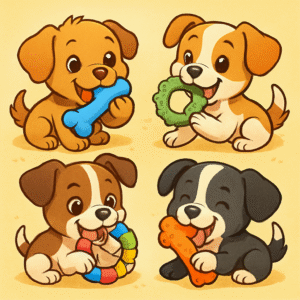Understanding Puppy Teething
Teething in puppies is a natural developmental process during which their deciduous, or baby, teeth emerge and eventually make way for permanent teeth. This stage is essential for puppies’ overall health, not only ensuring that they can chew food properly but also supporting their dental and jaw development. Recognizing the importance of teething can help pet owners manage this phase more effectively.
Puppy Teething Timeline
Weeks 2-4: Early Development
In the early stages of a puppy’s life, around weeks 2 to 4, the first signs of teething appear. Deciduous teeth, or baby teeth, begin to push through the gums. During this period, you might notice your puppy starting to chew on toys or other objects more frequently. Symptoms such as drooling or slight irritability can be common as the baby teeth surface.
Weeks 5-6: Emergence of Milk Teeth
By weeks 5 and 6, a puppy typically has a full set of around 28 milk teeth. This emergence can lead to increased chewing behavior as your puppy explores their new ability to gnaw. Chewing helps in the proper alignment and healthy development of teeth. Monitor your puppy’s behavior closely during this time to ensure they are not chewing on potentially harmful objects.
Weeks 8-12: Transition Phase
During weeks 8 to 12, discomfort may begin as the puppy transitions from milk teeth to permanent teeth. You might observe your puppy becoming more restless or chewing more aggressively. This is also the time when the roots of the milk teeth begin to be reabsorbed, making way for the permanent teeth. Encourage your puppy to chew on safe toys to alleviate discomfort during this phase.
Weeks 12-16: Eruption of Permanent Teeth
Permanent teeth start emerging prominently between weeks 12 to 16. This part of the teething timeline can be particularly challenging. You need to be wary of puppies chewing on furniture, shoes, or other valuables due to the discomfort experienced as permanent teeth push through the gums. Providing appropriate chew toys during this period can save your home from potential destruction.
Weeks 20-24: Completion Stage
By weeks 20 to 24, most puppies will have their full set of permanent teeth. It’s crucial to assess your puppy’s oral health at this stage to ensure there are no dental issues or malformations. Regular brushing and vet check-ups can help maintain healthy teeth and gums, preventing future dental problems.
Signs and Symptoms of Teething
Common behaviors indicating teething include excessive chewing, drooling, and mild irritability. Puppies may also experience swollen gums, occasional whining, and decreased appetite due to discomfort. Differentiating between normal teething symptoms and potential health issues is crucial, as persistent pain or swelling could indicate a problem that requires veterinary attention.
How to Soothe a Teething Puppy
Offering safe and effective teething toys is one of the best ways to soothe a teething puppy. Toys made of rubber or silicone with textures can massage the gums and relieve discomfort. Home remedies, such as offering cold carrots or frozen washcloths, can also help. Additionally, managing destructive chewing involves training and guiding the puppy to appropriate items, keeping them engaged and away from household objects.
When to Consult a Vet
While teething is a natural process, certain symptoms warrant a visit to the vet. If your puppy shows signs of severe pain, atypical swelling, or you notice bleeding that persists, a vet should be consulted. Dental issues like malocclusions—where the teeth don’t align properly—can lead to long-term problems and should be addressed promptly.
According to the American Veterinary Medical Association, “Regular veterinary visits beginning in puppyhood are vital for a puppy’s dental development and health.” This emphasizes the importance of early dental care and professional advice for a smooth teething process.
Conclusion
Understanding the stages of puppy teething and implementing effective care strategies can greatly ease this transitional period for both you and your puppy. By monitoring their progress and providing appropriate chew solutions, you help ensure the healthy development of their permanent teeth. Supporting them through this process strengthens the bond you share and promotes overall oral health.
FAQs
What are the first signs of teething in puppies?
Puppies often begin teething with excessive chewing, drooling, and a general tendency to bite as their baby teeth start to emerge.
How long does the teething phase last in puppies?
Teething can last from around 2 to 8 months, with the most intense period occurring when permanent teeth start to emerge between weeks 12 to 24.
What can I give my puppy for teething relief?
Rubber toys, frozen washcloths, and chilled carrots can provide relief. Avoid objects that are too hard or pose a choking risk.
Is it normal for a teething puppy to lose appetite?
Yes, puppies may eat less while teething due to gum discomfort. However, if appetite loss persists, consult a vet to rule out other health concerns.## FAQs
When do puppies start teething?
Puppies typically start teething around the age of 3 to 4 weeks, beginning with the emergence of their deciduous, or baby, teeth. This early teething phase usually lasts until the puppy is about 8 weeks old. Understanding this timeline is essential for pet owners to provide the necessary care and support as their puppy’s dental health starts to develop.
How many teeth do puppies lose during the teething process?
Puppies lose all 28 of their baby teeth as they transition to adult teeth. This involves a comprehensive process where baby teeth fall out and are replaced by 42 permanent teeth. Monitoring this progression and ensuring the proper shedding of baby teeth is important to prevent overcrowding or dental misalignment.
Can teething cause bad breath in puppies?
Yes, teething can sometimes lead to bad breath in puppies. This is often due to bacteria that accumulates in the mouth as the teeth are pushing through the gums. Regularly checking your puppy’s mouth and maintaining good dental hygiene can help minimize odor and promote overall oral health.
Are there specific breeds that experience more teething problems?
Some breeds, particularly small or brachycephalic breeds like Bulldogs or Pugs, may experience more pronounced teething issues due to their unique jaw and tooth alignment. This can lead to overcrowding or difficulties with proper dental eruption. It’s crucial to be mindful of these potential issues and consult your vet if you notice any irregularities.
How can I ensure my puppy’s teeth are developing correctly?
Regular dental check-ups with your veterinarian are essential to ensure your puppy’s teeth are developing correctly. Additionally, practicing good oral hygiene by brushing your puppy’s teeth regularly and providing appropriate chew toys can support healthy dental development. Keeping track of your puppy’s teething stages with your vet can help prevent future dental issues.








